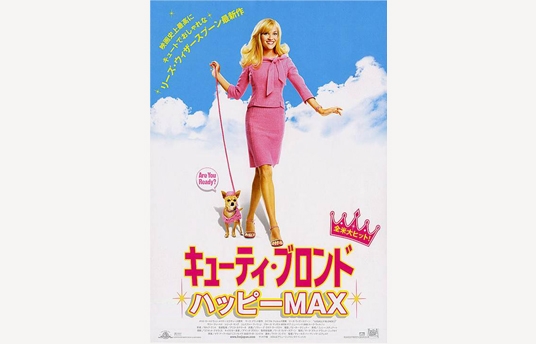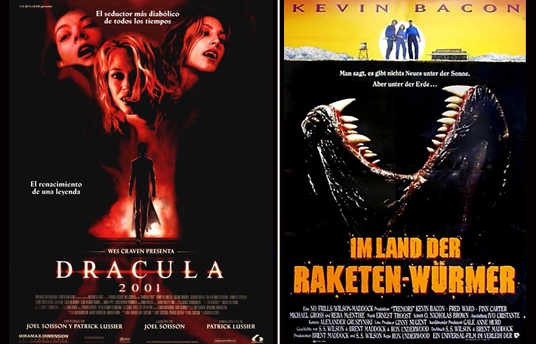Title Changes
Jun 23, 2013

'Legally Blonde: Red White and Blonde' became ‘Cutie Blonde: Happy MAX’ in Japan
By Emily Reubush
Recently, one of our followers asked why the animated film ‘Cat in Boots’, being known in the wider world as ‘Puss in Boots’, was called that when it showed at our film festival in 2011. I explained that this was not our decision; rather the change in title was the distributor’s decision when releasing the film in The Gulf. I decided to take a deeper look into the title change phenomenon.
1. Title changes are not uncommon and are made for reasons of language interpretation, to respect cultural sensitivities, to capitalise on region-specific interests, or simply to avoid misunderstandings. No matter how small our world is becoming, some things still do not travel well.
To address the original question, the change of ‘Puss in Boots’ to ‘Cat in Boots’ was a matter of simple understanding – ‘puss’ is a word used for ‘cat’ primarily in the UK and, despite the wide familiarity with the character from the ‘Shrek’ franchise being named Puss, it was decided ‘Cat in Boots’ was more straightforward. Ironically, the original fairytale, which was written in 1697 in French, was titled ‘Le Chat botté’ – translated into English as (you guessed it!) ‘Cat in Boots.’
Many title changes occur for a similar reason where the original title contains an idiom or reference that will not have the intended impact on potential viewers in a different country – even countries that share the same language. Here are just a few examples:
- ‘Hoosiers’ became ‘Free Throw’, ‘Best Shot’ and a number of other titles outside the USA. The familiar basketball-themed titles were selected because there was no guarantee that non-Americans would recognise ‘Hoosier’ as a name for someone from the state of Indiana
- ‘Live Free or Die Hard’ became ‘Die Hard 4.0’ outside the American market for the reason that the phrase ‘live free or die,’ which has immediately recognisable importance in America, has little-to-none elsewhere
- ‘Harry Potter and the Philosopher’s Stone’ was deemed ‘too cerebral’ for American kids, and so was titled ‘Harry Potter and the Sorcerer’s Stone’ when it was released across the pond (in book form as well as film). While this stings me personally, I confess I have to wonder how many American kids could define the word ‘cerebral’, so I suppose I cannot complain
- In another painful (to me) example of underestimating Americans, the working title of the James Bond film ‘Licence Revoked’ was changed to ‘Licence to Kill’ because it was feared the definition of the word ‘revoked’ was beyond colonial understanding
2. Sometimes, a title is changed because a product or company that it references is not available in the country in which it is released. Such was the case when the film originally called ‘Harold and Kumar Go to White Castle’, which centres on the many mishaps of two college students who get hungry and decide to go to White Castle, an American fast-food chain, was changed to ‘Harold and Kumar Get the Munchies’ once it left American shores to remove the reference to the franchise, which would be lost on other audiences.
3. Another common case is that of a similar but unrelated title already existing in the importing country.
- ‘The Avengers’ became ‘Avengers Assemble’ in the UK, to avoid any confusion with the immensely popular 60s television show entitled ‘The Avengers’
- ‘Dennis the Menace’ was released simply as ‘Dennis’ in the UK, as they have their own, unrelated character known by that same troublesome title
- In America, ‘Fast and Furious 5’ simply became ‘Fast 5’ because, even though it was the fifth of a well-known series, there was some anxiety that it would be confused with the ‘Furious 5’ of the Kung-Fu Panda franchise
4. Sometimes a sequel isn’t a sequel in certain markets, or the distributor hopes that the movie-going public will not equate a shiny new film with a previous flop.
- ‘Mad Max 2’ (or ‘Mad Max 2: The Road Warrior’) became ‘The Road Warrior’ in America, as the original ‘Mad Max’ only had a limited (and disappointing) release in the US, though it has since gained its a significant cult following there
- ‘Star Trek II: The Wrath of Khan’ and ‘Star Trek IV: The Voyage Home’ often had their numerals dropped, to avoid being equated with previous, not-so-great films
5. Date-related titles aren’t always the best way to go, once you consider the lag in releasing them around the world, and that’s why:
- ‘Dracula 2000’ became ‘Dracula 2001’
- ‘The Concorde: Airport ‘79’ became ‘Airport ’80: The Concorde’

Left: 'Dracula 2001', Right: ‘Tremors’
6. And yes, sometimes there is a political reasoning behind things.
- ‘Captain America: The First Avenger’ became simply ‘The First Avenger’ in the Ukraine, Russia and South Korea so as not to raise too much anti-American sentiment. (One would think, however, that audiences would quite quickly figure out the topic of the film)
Now, to counteract the icky taste of politics, here are my favourite two categories for you. First, the ‘let’s try to cash in on something completely unrelated’ group:
- ‘Teen Wolf’ , starring Michael J. Fox and released in the 80s, became ‘The Boy from the Future’ in Brazil. Because forget the whole werewolf thing – it’s totally Marty McFly!
- In a repeat offence, Brazil wanted to capitalise on Schwarzenegger’s popularity from ‘The Terminator from the Future’ (a.k.a. ‘The Terminator’) when he also starred in ‘Total Recall,’ which was then released as ‘The Avenger of the Future’
- A 1985 film, titled ‘Vision Quest’ in the US, became ‘Crazy for You’ internationally, to capitalise on Madonna’s involvement and the massive popularity of her single from the soundtrack – IMDb lists her role as ‘Singer at club.’
And perhaps the best of all reasons to change a film’s title – the ‘why not?’ category:
- ‘Legally Blonde: Red White and Blonde’ became ‘Cutie Blonde: Happy MAX’ in Japan
- ‘Tremors’ is known as ‘In the Country of Rocket Worms’ in Germany
So the moral of the story, friends, is don’t make any assumptions if the title on your cinema ticket doesn’t quite match that which you were expecting. There are many, many reasons it may have been changed, and it’s the distributor who has the final say. Some changes are obvious, some may seem outrageous, but there is a reason behind all – even if we cannot imagine what that is.